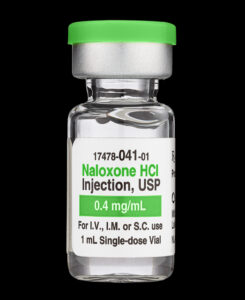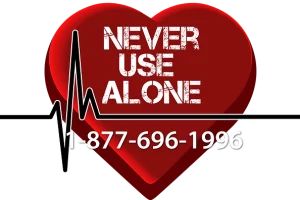OVERDOSE PREVENTION
Overdoses are preventable!
As reported by the CDC and The White House, over 107,000 people have died from overdoses in 2021. With safe practices and supplies available, along with harm reduction knowledge, communities can be better equipped to prevent overdoses.
What are the signs of an overdose?
The #1 sign is unresponsiveness. Other major signs include not breathing, deep snoring, vomiting, blue lips and/or fingers, and gasping and/or gargling.
If you think someone is experiencing an overdose:
- Check if they are responsive by rubbing your fist hard up and down their chest along the sternum.
- Call 911 and state what you see: “The person is unconscious and not breathing.” Clearly state your location/address.
- Administer Naloxone (nasal spray, injection, or auto-injectable). Stay with the person as Naloxone’s effects only last 30-90 minutes. There is a chance of continued overdose.
- Give rescue breathing. Tilt their head slightly, pinch their nose, and give one breath every 5 seconds.
What’s Naloxone?*
 More frequently known by the brand name Narcan®, Naloxone is a life-saving and harmless medicine that reverses an opioid overdose. It’s also available in three forms: nasal spray, intramuscular injection, and auto-injection.
More frequently known by the brand name Narcan®, Naloxone is a life-saving and harmless medicine that reverses an opioid overdose. It’s also available in three forms: nasal spray, intramuscular injection, and auto-injection.
Narcan® has recently been approved to be available over the counter and is easy to use. Many SSPs and Harm Reduction programs, including the Rover Program and CTHRA, distribute Naloxone/Narcan® for free.
Alternatively, there is also an option to request Naloxone via mail order from Next Distro if you do not have resources in your community.
Never Use Alone

A toll-free national overdose prevention, detection, life-saving crisis response, and medical intervention services for people who use drugs while alone. Available 24 hours a day, 7 days a week, 365 days a year.
When you call, you will be asked for your first name (it can be a fake name if you prefer. They just want to know what to call you while we’re talking to you), phone number, EXACT location, the county you are in, and what substance you’re using.
*Disclaimers:
Naloxone is not a substitute for emergency medical services. If you administer Naloxone or think someone is overdosing, call 911.
RHI is not a prescriber. However, through participation in the states OPEN ACCESS program we are allowed to train and dispense naloxone. Anyone over the age of sixteen is allowed to receive Naloxone after having been trained on its use, and anyone under that age may receive it with parental consent.
